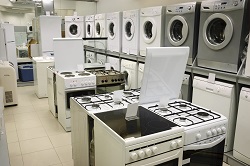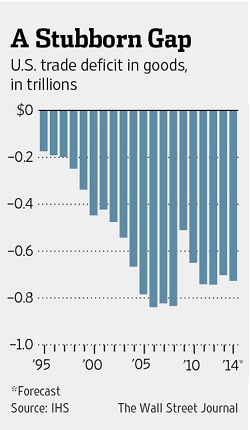 The National Retail Federation downgraded its 2014 growth estimate by half a point to 3.6%, realizing, unfortunately, that weak demand early in the year ran deeper than just a response to the especially harsh winter. Customer liquidity is probably not the problem, especially since median incomes are finally on the rise and the home improvement sector has risen nearly ten points in the past year.
The National Retail Federation downgraded its 2014 growth estimate by half a point to 3.6%, realizing, unfortunately, that weak demand early in the year ran deeper than just a response to the especially harsh winter. Customer liquidity is probably not the problem, especially since median incomes are finally on the rise and the home improvement sector has risen nearly ten points in the past year.
So appliance store managers and owners interested in increasing sales and cultivating referral-rich customer relationships look at how demand has changed and strive to develop closing techniques tailored to today’s buyer.
Changes in demand fall into three broad categories: the first reflects the rise of a nearly ideological approach to high-value purchases; the second arises from new expectations for the shopping experience itself; and the third is as old as time.
1. The Ideological Shopper
 Of the many lessons Americans learned over the course of the recession, this one has the greatest potential to have a long-term impact on the appliance industry: changing demand changes the country.
Of the many lessons Americans learned over the course of the recession, this one has the greatest potential to have a long-term impact on the appliance industry: changing demand changes the country.
Americans now think of shopping in almost political terms, and they set out to use their purchases to impact the types of businesses they wish to see succeed. Dramatic market inroads made by organic food, green building materials and alternative power train cars indicate that growing numbers of Americans intend to use their power of purchase to change society.
And since every $1 worth of manufacturing activity returns $1.48 to the economy, Americans may have collectively realized that “buying American” may be more important to their individual economic wellbeing than finding the lowest price.
It’s also hard not to notice that the U.S. trade deficit, which compares how much less we export than we import, quadrupled in the years leading up to the start of the recent recession, peaking just shy of a trillion dollars when the crisis hit and costing over five million manufacturing jobs in the process.
While credit flowed freely and real estate values rose uninterruptedly, many Americans were pleased to enjoy the lower prices foreign manufactures afforded.
But now the trend is to revive American manufacturing – by changing demand. “Buy American” is no longer a plaintive cry from a decaying Detroit; it has become a national movement.
And it is already working. The pace at which US manufacturers consume metal has accelerated so quickly ours is the only developed economy in the world with a shortage of steel and this summer manufacturing grew at the strongest pace in three years, with orders for big-ticket items – including appliances – soaring.
Moreover, today’s appliance buyer chooses the brand she wants and then chooses a retailer carrying it, indicating that controlling which jobs are supported by her purchase may impact her decision as much as online reviews and ratings.
2. The Experiential Shopper
And reviews and ratings of the appliance are hardly the only ones relevant to determining where she goes to make her purchase.
Your reviews and ratings matter at least as much. In fact, more than four out of five consumers think of brands and businesses in terms of personal relationships, saying that if you try to keep them as customers you will probably succeed. When you make a sincere effort, it matters – a lot.
Your customer likes to feel that she is in a relationship of equals, so not only is it OK for you to make demands upon her, doing so can actually deepen your interaction and make a sale more likely. Ask about past experiences, about cooking preferences or about the impression she wants guests to have when they enter her kitchen, and expect complete answers.
Retailers who fully appreciate the fact that other customers comprise a critical aspect of the buying experience will even demand smiles and a positive attitude.
And that makes great business sense, because for fully 63% of consumers tested – under laboratory conditions, no less – simply thinking about great customer service made their heart race and usually triggered the same cerebral reaction as feeling loved.
3. The Impatient Shopper
 And what could make a shopper in love happier than closing the sale so she can get her purchase today?
And what could make a shopper in love happier than closing the sale so she can get her purchase today?
If she’s chosen her brand based upon her desire to revive U.S. manufacturing and she’s chosen you because of your excellent reputation, and if she’s now fully attached to the appliance to which you’ve expertly guided her, the last thing you want to do is let her leave before completing the transaction.
But love is blind, and sometimes the object of your customer’s affection may be just beyond her means. Since the recession, Americans have become much more fiscally conservative; meaning a customer who may have charged a purchase in the past will no longer consider doing so. Most Americans use far less credit than credit card companies issue to them, and many make purchases only after they have saved up enough for them.
If you’ve moved her past her budget, offering financing to close the deal might very well sour that loving feeling and introduce the first hard “no” into your conversation, a direction you do not want to go. Rather than suggest she take on interest payments, you could make a far more respectful offer.
We call it “in-home layaway,” where you let your customer write two to four checks to be deposited over a period of time. Since we guarantee each check, you know for sure that those future deposits will be good (if one is returned you get paid anyway and CrossCheck deals with the problem). Best of all from your customer’s point of view, since you’re not offering financing she won’t pay interest.
Instead, she gets to have her new appliance now and you get to establish your new relationship in as positive a manner as possible. If there will be fewer sales this year than expected, be sure you close every opportunity that comes your way – and turn each close into a referral. Learn more here.




